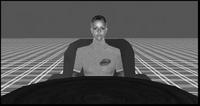 If you ever hear a rat sigh, don’t worry it’s not because they’re getting impatient, rather it’s because they’re relieved, a behaviour that probably evolved as a safety signal to other rats. That’s according to Stefan Soltysik and Piotr Jelen at the Limbic System Laboratory of the Nencki Institute of Experimental Biology in Warsaw.
If you ever hear a rat sigh, don’t worry it’s not because they’re getting impatient, rather it’s because they’re relieved, a behaviour that probably evolved as a safety signal to other rats. That’s according to Stefan Soltysik and Piotr Jelen at the Limbic System Laboratory of the Nencki Institute of Experimental Biology in Warsaw.Over hundreds of trials, Soltysik and Jelen trained 16 rats to expect an electric shock to their tail after they heard an auditory tone, but not to expect a shock if a light came on after the tone. In this way, fear could be induced in the rats, followed by relief if they saw the light come on. All the while, the researchers monitored the rats’ breathing by recording their diaphragm muscles. Sighs are easily recognisable, the researchers explained, because they appear as a “deep ‘additional’ inhalation that starts at or around the peak of a normal respiratory cycle”.
Three hundred and eleven sighs were recorded across the course of the experiment, the vast majority of them during the ‘relief phase’ that followed a light coming on, indicating a shock would not occur. Averaged across all the rats, 7.4 times more sighs occurred during this ‘relief phase’ than during the equivalent period when the light didn’t come on – a fear phase – that occurred between the tone sounding and a shock being given.
The researchers said it’s possible “This respiratory act was recruited during evolution to signal reduced perception of danger, and/or to synchronise the emotional state of the group (collective sighs of relief?)…” They added that “the sigh could be a signal opposite to the alarm cry”.
To test this theory further they plan experiments to see if sighing is more prevalent in the company of other rats, and to test whether sighing is impaired in rats raised in social isolation.
_________________________________
Soltysik, S. & Jelen, P. (2005). In rats, sighs correlate with relief. Physiology and behaviour, 85, 598-602.
You have read this article with the title October 2005. You can bookmark this page URL http://psychiatryfun.blogspot.com/2005/10/phew-how-rats-sigh-when-they-relieved.html. Thanks!

 Whereas countless studies have examined the effect of negative psychological states on levels of cortisol – a corticosteroid hormone that is associated with stress and ill-health – few, if any, have looked at the effect of positive psychological states on the hormone, a fact that
Whereas countless studies have examined the effect of negative psychological states on levels of cortisol – a corticosteroid hormone that is associated with stress and ill-health – few, if any, have looked at the effect of positive psychological states on the hormone, a fact that  A growing body of evidence suggests that we understand other people’s actions and intentions by simulating their movements in the motor pathways of our own brain. Now a study suggests that peripheral sensation and proprioception – the sense of where our limbs are in space – also play a role in this process, specifically when it comes to inferring other people’s expectations from the way they move.
A growing body of evidence suggests that we understand other people’s actions and intentions by simulating their movements in the motor pathways of our own brain. Now a study suggests that peripheral sensation and proprioception – the sense of where our limbs are in space – also play a role in this process, specifically when it comes to inferring other people’s expectations from the way they move.





